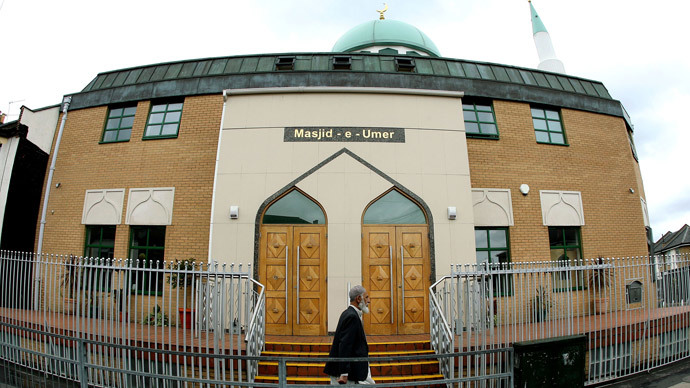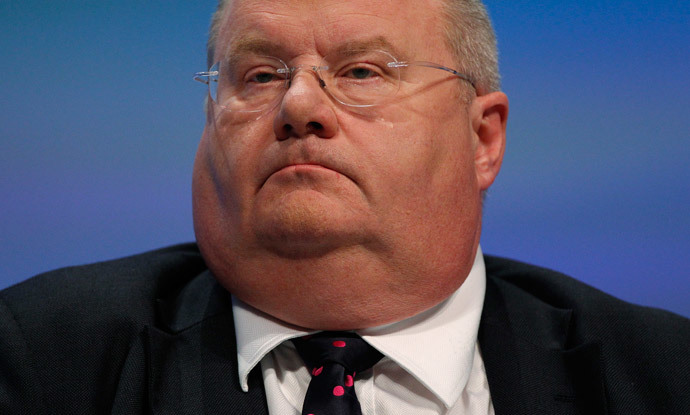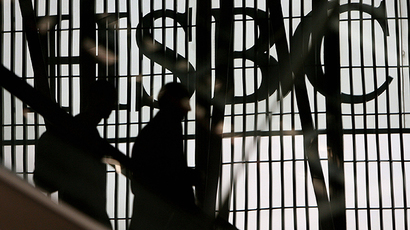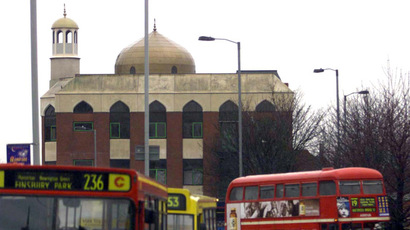Muslim leaders accuse UK govt of pandering to ‘far right’

Muslim leaders have criticized the government for pandering to the “far right” after it sent a letter to every UK mosque telling faith leaders they must do more to root out the “men of hate” who promote extremism.
The letter, titled, “Terrorist attacks in Paris,” written by the Communities Secretary Eric Pickles and minister Lord Ahmed, urges Muslim leaders to “publicly condemn” Al-Qaeda and other violent Islamist groups.
“We have recently seen terrible atrocities committed in Paris. Finding the right response to these events is a challenge for everyone. The hijacking of a great faith to justify such heinous crimes sickens us all. As Muslims around the world have made clear, such actions are an affront to Islam,” the letter reads.
“But there is more work to do. We must show our young people, who may be targeted, that extremists have nothing to offer them. We must show them that there are other ways to express disagreement: that their right to do so is dependent on the very freedoms that extremists seek to destroy.”
“We must show them the multitude of statements of condemnation from British Muslims; show them these men of hate have no place in our mosques or any place of worship, and that they do not speak for Muslims in Britain or anywhere in the world.”
The letter says that faith leaders are in a “unique position” and have an “important responsibility” in explaining how Islam and “British identity” can be compatible.
“There is a need to lay out more clearly than ever before what being a British Muslim means today: proud of your faith and proud of your country. We know that acts of extremism are not representative of Islam; but we need to show what is,” the letter adds.

The letter sparked anger from many in the British Muslim community, who argue that by referencing “members of the far right” who do not share “British values,” the letter indirectly associates them with British Muslims.
“We will be writing to Mr Eric Pickles to ask that he clarifies his request to Muslims to 'explain and demonstrate how faith in Islam can be part of British identity'. Is Mr Pickles seriously suggesting, as do members of the far right, that Muslims and Islam are inherently apart from British society?” said Harun Khan, deputy secretary of the Muslim Council of Britain (MCB).
Other Muslim preachers, including Sheikh Ibrahim Mogra, have also said the letter ignores the efforts put in by Muslim organizations to combat extremism within British Muslim communities.
Speaking to the International Business Times (IBT), Mogra said: “When has a minister ever written to other religious groups like this? This is not a problem we can lay at the doorsteps of imams and mosques for them to solve.”
Mogra also told the IBT that the the internet was more likely to radicalize potential terrorists, rather than mosques.
The letter was sent to over 1,000 Muslim leaders on Friday, just a week after a terrorist attack in Paris, carried out by three French Muslims, killed 17 people and injured more than a dozen others.
Lord Ahmad defended the letter, calling the Muslim Council of Britain’s reaction “disappointing.”
Speaking to BBC Radio 4 on Monday, Ahmad added that the letter acknowledged Muslims were part of British society, and that it was designed to reassure members of the Muslim community that they were not being purposely targeted.
“This was about reassurance, it was about recognizing, as Theresa May said only yesterday, that a Britain without Muslims, a Britain without Jews, Hindus, would not be the Britain we want to see,” he told the program.
While former chief rabbi Lord Sacks sympathized with the concerns of the Muslim community over the letter, he added that radical Islam was a global issue that had more resonance on social media websites.
While believing that the letter was “well intentioned” he said he would not be “surprised if the Muslim community did not say: ‘You are asking of us something that is not actually under our control.’”
However, Sacks commented that the Muslim community had “not done enough” to ensure that teaching inside Islamic institutions encouraged integration, citing the experiences of Jews in Britain during the 19th century.
“I don’t think that has been done with other ethnic minority communities. Radicalized imams have in the past been preaching a message of hate,” he added.














